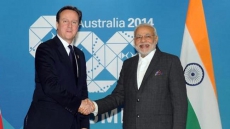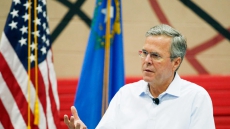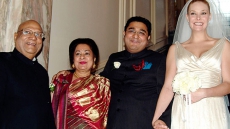WASHINGTON — Americans place a higher priority on preserving the religious freedom of Christians than for other faith groups, ranking Muslims as the least deserving of the protections, according to a new survey.
Solid majorities said it was extremely or very important for the U.S. to uphold religious freedom in general. However, the percentages varied dramatically when respondents were asked about specific faith traditions, according to a poll by The Associated Press and the NORC Center for Public Affairs Research.
Eighty-two per cent said religious liberty protections were important for Christians, compared with 61 per cent who said the same for Muslims. About seven in 10 said preserving Jews' religious freedom was important, while 67 per cent said so of Mormons. People who identified with no religion were ranked about even with Muslims in needing support to live out their beliefs.
Charles Haynes, director of the Religious Freedom Center of the Newseum Institute, said the findings reflect deep divisions among Americans about the very definition of religious liberty, which has taken on newly politicized meanings in a time of debate over gay marriage and the threat from Islamic extremists.
"Religious freedom is now in the eye of the beholder," Haynes said. "People in different traditions, with different ideological commitments, define religious freedom differently."
The poll was conducted Dec. 10 through Dec. 13, after Islamic extremist attacks in Paris and San Bernardino, California, and during intensifying anti-Muslim rhetoric by Donald Trump and other candidates for the Republican presidential nomination. The furor has led to a spike in vandalism of mosques and harassment of U.S. Muslims over the last month.
In the survey, 88 per cent of Republicans said it was important to protect the religious liberty of Christians, while only 60 per cent said so for Muslims. Democrats also ranked religious freedom for Muslims as a lower priority. Eighty-three per cent of Democrats said the protections were important for Christians, while only 67 per cent said so for Muslims.
A Pew Research Center survey last year found an increasing share of Americans believe Islam is more likely than other religions to encourage violence among its followers. Several outspoken critics have emerged who argue Islam itself is a threat to the U.S.

"These numbers seem to be part of a growing climate of anti-Muslim sentiment in the United States," said Madihha Ahussain, an attorney for Muslim Advocates, a California-based civil rights group. "This climate of hatred has contributed to dozens of incidents of anti-Muslim violence in recent weeks."
Helen Decker, 65, a West Texas Christian who reads the Bible regularly, believes strongly that religious freedom should be provided to people of all faiths or no faith, including for her grandson whom she said is an atheist. But she said Muslims can only earn the same religious liberty protections "under certain circumstances — that they can show that they are not a radical Muslim."
"Muslims — they need to be protected just like Christians, unless they pose harm to human life," Decker said.
But John Ashford of Chicago, who is retired from the U.S. military and the Postal Service, said "it's not right" to deny religious liberty protections to Muslims. He said officials have been showing too much deference to Christians for political reasons, in what he considers a threat to the separation of church and state.
"There's supposed to be equal protection under the law — that's what the Constitution says," he said. "If you're not doing that, you're doing something wrong."
Public discussion about religious freedom in 2015 focused largely on demands for government accommodation for objectors to same-sex marriage, which became legal nationwide in June. The debate played out most dramatically in the conflict over Indiana's Religious Freedom Restoration Act and in the case of Kentucky clerk Kim Davis, who spent five days in jail for refusing to issue marriage licenses to same-sex couples.
Those who oppose steps to accommodate religious objections to same-sex marriage see such exemptions as an attempt to undermine newly won rights for gays and lesbians.
But advocates for broad exemptions, including U.S. Roman Catholic bishops and Southern Baptist leaders, say the requests are in line with the longstanding American tradition of protecting individual conscience.
Greg Scott of the Alliance Defending Freedom, a Christian public interest law firm, said a focus on protecting Christians right now "makes sense in that Christians today are facing mounting threats to their religious liberty by acts of state officials and bureaucrats." AP-NORC polls have found dwindling confidence in the government's defence of religious liberty, with 75 per cent in 2011 saying the government was doing a good job, compared with 55 per cent who said so this month.
In the latest survey, eight in 10 Americans said it was very or extremely important for people like themselves to be allowed to practice their religion freely.
But Eric Rassbach, an attorney with the Becket Fund for Religious Liberty, a public interest law firm that takes clients of all faiths, said "people may not realize you cannot have a system where there's one rule for one group and another rule for a different group you don't like."
"No religion is an island," Rassbach said. "If somebody else's religion is being limited by the government, yours is liable to be limited in the same way. Even if you only care about your own particular group, you should care about other groups, too, because that's the way the law works."
The AP-NORC poll of 1,042 adults was conducted online and by phone using a sample drawn from NORC's probability-based AmeriSpeak panel, which is designed to be representative of the U.S. population. The margin of sampling error for all respondents is plus or minus 3.9 percentage points.
INTERNET SURVEILLANCE ON AMERICANS, WITHOUT WARRANT, IS OK WITH MOST PEOPLE
WASHINGTON — A majority of Americans say they support warrantless government surveillance of the Internet communications of U.S. citizens, according to a new poll by The Associated Press and the NORC Center for Public Affairs Research.
It's at least somewhat important for the government to sacrifice freedoms to ensure safety, most say in the survey.
Here are some things to know about public opinion on civil liberties from the AP-NORC poll:
___
MOST SUPPORT WARRANTLESS SURVEILLANCE
According to the new poll, 56 per cent of Americans favour and 28 per cent oppose the ability of the government to conduct surveillance on Internet communications without needing to get a warrant. That includes such surveillance on U.S. citizens.
Majorities both of Republicans (67 per cent) and Democrats (55 per cent) favour government surveillance of Americans' Internet activities to watch for suspicious activity that might be connected to terrorism. Independents are more divided, with 40 per cent in favour and 35 per cent opposed. Only a third of Americans under 30, but nearly two-thirds 30 and older, support warrantless surveillance.
The poll finds that for most Americans, safety concerns trump civil liberties at least some of the time.
More than half — 54 per cent — say it's sometimes necessary for the government to sacrifice freedoms to fight terrorism, while 45 per cent think that's not necessary. On a more general level, 42 per cent say it's more important for the government to ensure Americans' safety than to protect citizens' rights, while 27 per cent think rights are more important and 31 per cent rate both equally.

TERRORISM CONCERNS RISING
Concerns about terrorism have risen since 2013. In the latest poll, nearly 6 in 10 Americans say they are at least somewhat concerned that they or their family might be victims of a terrorist attack, after just 3 in 10 said so two years ago.
Six in 10 Americans now think that the recent attacks in Paris and San Bernardino, California, indicate an increased risk of attacks against Western countries, while 37 per cent think the risk is about the same as it was before. Three-quarters of Republicans and majorities of both Democrats and independents think the attacks are an indication of increased risk.
Americans are similarly concerned about both domestic terrorism and possible attacks by Islamic extremist groups, with about 6 in 10 saying they're at least somewhat concerned about each.
Democrats and Republicans are about equally likely to say they're concerned about domestic terrorism, but Republicans are much more likely than Democrats to say they're concerned about attacks by Islamic extremists, 67 per cent to 47 per cent.
___
MIXED OPINIONS ON PROTECTING RIGHTS
Americans have mixed views of how the government is doing at protecting their rights.
Seven in 10 say it does at least a somewhat good job protecting the right to vote, and nearly 6 in 10 say it's doing a good job of protecting freedom of speech and of the press. More than half say it's doing a good job of protecting religious liberties.
But just 4 in 10 Americans rate the government's performance as good on protecting the right to equal protection under the law, freedom from unreasonable search and seizure, or the right to bear arms.
Democrats are significantly more likely than Republicans to say the government is doing a good job of protecting the right to freedom of religion, 64 per cent to 49 per cent.
On protecting the right to bear arms, 46 per cent of Democrats and just 33 per cent of Republicans think the government is doing a good job.
___
DIVIDE ON RELIGIOUS LIBERTIES
Majorities of Americans think it's important to protect religious freedoms for a variety of religious groups, including Christians, Muslims and Jews.
But they're significantly more likely to say so of some groups than others. While 82 per cent of Americans in the poll say that it's extremely or very important that Christians be allowed to freely practice their religion in the United States, just 61 per cent say the same for Muslims. Seventy-two per cent say religious freedom is important for Jews, and 67 per cent say the same of Mormons. And 63 per cent say it's important to protect the freedoms of people with no religion.
Among Republicans, 88 per cent say it's important that Christians be able to worship freely and 60 per cent say so of Muslims. Among Democrats, too, there's a gap, with 83 per cent saying religious liberties are important for Christians and 67 per cent saying so for Muslims.
Eight in 10 Americans say it's very or extremely important for people like themselves to be allowed to practice their religion freely.
___
The AP-NORC Poll of 1,042 adults was conducted online and by phone Dec. 10-13 using a sample drawn from NORC's probability-based AmeriSpeak panel, which is designed to be representative of the U.S. population. The margin of sampling error for all respondents is plus or minus 3.9 percentage points.
Respondents were first selected randomly using address-based sampling methods, and later interviewed online. People selected for AmeriSpeak who didn't otherwise have access to the Internet were interviewed over the phone.




